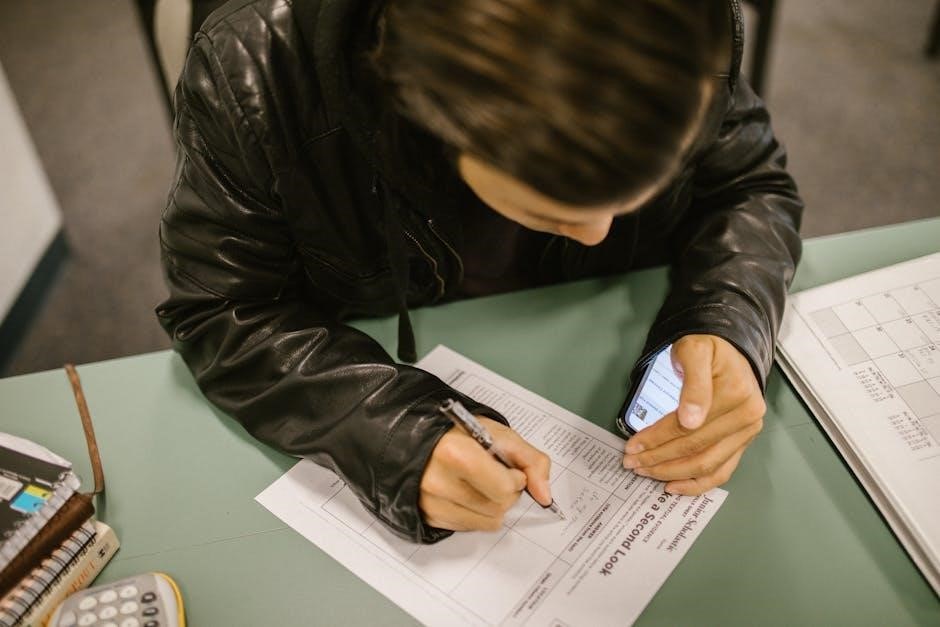The IBEW Journeyman Lineman Test is a standardized exam assessing knowledge and practical skills for aspiring linemen․ It evaluates understanding of electrical systems‚ safety protocols‚ and industry standards‚ ensuring competency for high-voltage work․
Overview of the IBEW Journeyman Lineman Test
The IBEW Journeyman Lineman Test is a comprehensive assessment designed to evaluate both theoretical knowledge and practical skills required for linemen․ It covers critical areas such as electrical systems‚ safety protocols‚ and climbing techniques․ The test ensures candidates demonstrate competence in handling high-voltage equipment and understanding industry standards․ A passing score is essential for certification‚ serving as a gatekeeper for advanced roles in the field․ This exam is a pivotal step for aspiring linemen‚ validating their readiness to perform safely and effectively in challenging environments․
Importance of the Test for Aspiring Linemen
The IBEW Journeyman Lineman Test is crucial for aspiring linemen as it validates their expertise and readiness to work safely in high-voltage environments․ Passing the test demonstrates mastery of electrical systems‚ safety protocols‚ and practical skills‚ ensuring compliance with industry standards․ It serves as a gateway to advanced roles‚ increased earning potential‚ and union membership benefits․ The certification is essential for building a reputable career‚ as it signifies a lineman’s ability to perform critical tasks effectively and safely‚ making it a cornerstone of professional advancement in the electrical trade․

Understanding the Test Format and Content
The IBEW Journeyman Lineman Test assesses knowledge and practical skills in electrical systems‚ safety protocols‚ and industry standards․ It covers key topics like electrical theory‚ distribution systems‚ and climbing techniques‚ ensuring comprehensive preparedness for real-world challenges in the field․
Structure of the IBEW Journeyman Lineman Test
The IBEW Journeyman Lineman Test is a comprehensive assessment divided into written and practical sections․ The written portion evaluates knowledge of electrical theory‚ distribution systems‚ and safety protocols․ The practical segment tests hands-on skills‚ such as climbing techniques and equipment operation․ Questions are multiple-choice‚ with a focus on problem-solving and industry standards․ Candidates are scored based on accuracy and adherence to safety procedures․ Time limits apply to each section‚ ensuring candidates demonstrate both knowledge and efficiency․ The test structure is designed to reflect real-world scenarios‚ preparing linemen for the challenges of the job․
Key Topics Covered in the Test
The IBEW Journeyman Lineman Test covers essential topics such as electrical theory‚ distribution systems‚ and safety protocols․ It emphasizes knowledge of high-voltage systems‚ transformers‚ and circuit analysis․ Candidates are tested on climbing techniques‚ rigging procedures‚ and the use of specialized tools․ The exam also includes questions on OSHA standards‚ first aid‚ and emergency response․ Additionally‚ it assesses understanding of electrical codes‚ load calculations‚ and troubleshooting methods․ Practical skills‚ such as equipment operation and line construction‚ are also evaluated to ensure readiness for real-world challenges in the field․

The Role of a Journeyman Lineman
A journeyman lineman is a skilled professional responsible for installing‚ maintaining‚ and repairing high-voltage electrical lines and systems․ Their work ensures reliable power distribution and public safety․
Responsibilities and Duties of a Journeyman Lineman
A journeyman lineman is responsible for installing‚ maintaining‚ and repairing high-voltage electrical lines and systems․ They ensure power distribution is reliable and safe‚ often working at heights․ Key duties include responding to power outages‚ performing routine inspections‚ and using specialized tools for Line work․ They must interpret electrical diagrams‚ adhere to safety protocols‚ and collaborate with teams to complete tasks efficiently․ Physical stamina is essential‚ as the role involves climbing poles and lifting equipment; Linemen also troubleshoot issues and ensure compliance with industry regulations‚ playing a critical role in maintaining electrical infrastructure․
Skill Requirements and Physical Demands
A journeyman lineman must possess strong knowledge of electrical systems‚ safety protocols‚ and problem-solving skills․ Proficiency in using tools like bucket trucks‚ wire pullers‚ and climbing gear is essential․ Physical demands include climbing tall structures‚ lifting heavy equipment‚ and working in challenging weather conditions․ Stamina‚ hand-eye coordination‚ and attention to detail are critical․ Linemen must also be comfortable working at heights and in confined spaces․ Strong communication skills are necessary for teamwork and safety․ The role requires adaptability‚ resilience‚ and the ability to work under pressure‚ ensuring reliable power distribution in diverse environments․

Eligibility Requirements for the Test
To qualify for the IBEW Journeyman Lineman Test‚ candidates must meet specific criteria‚ including completing an approved apprenticeship program‚ gaining relevant work experience‚ and meeting age requirements․
Education and Work Experience Requirements
To qualify for the IBEW Journeyman Lineman Test‚ candidates must complete an approved apprenticeship program or have equivalent work experience․ Typically‚ this includes 4-5 years of hands-on training under the supervision of a licensed journeyman lineman․ The apprenticeship covers electrical theory‚ safety protocols‚ and practical skills․ Additionally‚ applicants must be at least 18 years old and possess a high school diploma or equivalent․ Some programs may require algebra and physics coursework to ensure a strong foundation for the technical aspects of the job․ Work experience should demonstrate proficiency in climbing‚ equipment operation‚ and teamwork․
Application Process and Fees
The application process for the IBEW Journeyman Lineman Test involves submitting proof of completed apprenticeship or equivalent work experience․ Candidates must provide documentation‚ such as transcripts or certificates‚ to verify their training․ Fees vary by location and union policies but typically include a registration fee for the test and potential dues for union membership․ Payments are usually made online or through local union offices․ It’s important to check with the specific IBEW local for exact pricing and submission deadlines․ These fees support administrative costs and union resources for members․

Study Materials and Resources
Recommended textbooks‚ online resources‚ and practice tests are essential for preparation․ Utilize study guides‚ interactive tools‚ and forums to enhance knowledge and test-taking strategies effectively․
Recommended Textbooks and Study Guides
Key textbooks include the Lineman’s Handbook and Electrical Transmission and Distribution Systems‚ which cover fundamental principles and practical applications․ Study guides like the IBEW Lineman Test Prep offer focused practice questions and exam strategies․ These resources emphasize electrical theory‚ safety protocols‚ and hands-on scenarios‚ aligning with test content․ Utilize these materials to build a strong foundation and reinforce learning․ Ensure to consult the latest editions to stay updated with industry standards and advancements․
Online Resources and Practice Tests
Several online platforms provide valuable resources for preparing for the IBEW Journeyman Lineman Test․ The IBEW’s official website offers practice tests and study materials tailored to the exam․ Websites like UnionTestPrep․com and LinemanTest․com feature mock exams‚ flashcards‚ and video tutorials․ Additionally‚ online forums such as Reddit’s r/IBEW allow candidates to share strategies and experiences․ These resources help familiarize test-takers with the exam format and content‚ ensuring a more confident and prepared approach to the test․

Test Preparation Strategies
Develop a structured study schedule‚ focusing on weak areas and using flashcards for key terms․ Practice under timed conditions to improve speed and accuracy․ Stay consistent and review materials regularly to build confidence and mastery of the content․
Effective Study Techniques for the Test
Effective study techniques for the IBEW Journeyman Lineman Test include active recall‚ spaced repetition‚ and practice tests․ Use flashcards to memorize key terms and concepts․ Break study material into manageable sections‚ focusing on weak areas; Engage in group study sessions to discuss complex topics․ Utilize online resources and textbooks to reinforce learning․ Prioritize hands-on practice to apply theoretical knowledge․ Regularly review and test yourself to identify gaps in understanding․ Maintain a consistent study schedule to build confidence and mastery of the material․ Stay organized and focused to ensure thorough preparation․
Time Management and Test-Taking Tips
Effective time management is crucial for success on the IBEW Journeyman Lineman Test․ Create a detailed study schedule‚ allocating specific time blocks for each topic․ Prioritize challenging areas and review them frequently․ During the test‚ read each question carefully and eliminate incorrect answers before selecting the best option․ Manage your time wisely‚ ensuring you attempt all questions within the allotted period․ Stay calm and focused to avoid errors due to nervousness․ Practice with timed mock tests to build stamina and improve decision-making under pressure․ A well-organized approach will enhance your performance and confidence․

Common Challenges and Mistakes
Common challenges include inadequate time management‚ insufficient practice with mock tests‚ and neglecting foundational concepts․ Many candidates also fail to seek clarification on confusing topics‚ leading to errors․
Common Mistakes to Avoid During Preparation
One common mistake is insufficient practice with mock tests‚ leading to time management issues during the actual exam․ Another error is neglecting foundational concepts‚ focusing instead on complex topics without a solid base․ Candidates often overlook reviewing safety protocols and industry standards‚ which are critical components of the test․ Additionally‚ some fail to seek clarification on confusing topics‚ leading to avoidable errors․ Proper preparation requires a balanced approach‚ combining theoretical study with practical application and consistent practice to build confidence and accuracy․
Strategies to Overcome Test Anxiety
To manage test anxiety‚ create a structured study plan and stick to it‚ ensuring consistent preparation․ Practice with mock tests to familiarize yourself with the format and timing․ Focus on understanding concepts rather than just memorizing‚ as this builds confidence․ Engage in regular physical activity and maintain a healthy diet to support mental well-being․ Get adequate rest before the test to ensure clarity of thought․ Utilize relaxation techniques‚ such as deep breathing or meditation‚ to stay calm during the exam․ Surround yourself with a supportive network to help alleviate stress and maintain a positive mindset․

Apprenticeship and Training Programs
IBEW apprenticeships combine classroom instruction with hands-on training‚ covering safety‚ electrical theory‚ and practical skills․ Apprentices work under experienced journeyman linemen to master the trade․
Overview of IBEW Apprenticeship Programs
IBEW apprenticeship programs are comprehensive training initiatives designed to equip individuals with the skills and knowledge needed to excel as journeyman linemen․ These programs typically span several years and combine rigorous classroom instruction with on-the-job training․ Apprentices learn critical aspects of electrical work‚ including safety protocols‚ electrical systems‚ and hands-on techniques․ The programs are structured to ensure a well-rounded education‚ preparing apprentices for the demands of the field․ Completion of an IBEW apprenticeship is a significant step toward obtaining journeyman certification and advancing in the trade․
Benefits of Completing an Apprenticeship
Completing an IBEW apprenticeship offers numerous benefits‚ including increased earning potential‚ access to union benefits‚ and enhanced job security․ Apprentices gain hands-on experience and mentorship from experienced journeymen‚ ensuring they develop the skills and confidence needed for the trade․ Many programs also provide a stipend or wage during training‚ allowing apprentices to support themselves while learning․ Upon completion‚ apprentices are well-prepared to pass the Journeyman Lineman Test and secure high-paying union jobs․ Additionally‚ union membership provides access to exclusive resources‚ training opportunities‚ and a strong support network‚ further advancing career growth and stability in the electrical industry․

Union Membership and Benefits
IBEW union membership elevates your career with higher wages‚ enhanced benefits‚ and job security․ It also provides a supportive network and access to exclusive training resources․
Advantages of Joining the IBEW Union
Joining the IBEW union offers numerous benefits‚ including competitive wages‚ comprehensive health insurance‚ and robust retirement plans․ Union members also gain access to exclusive training programs and apprenticeships‚ ensuring career advancement and skill enhancement․ Additionally‚ the IBEW provides a strong support system‚ advocating for workers’ rights and safe working conditions․ Union membership fosters a sense of community and camaraderie among linemen‚ while also offering legal and financial assistance․ These advantages make the IBEW a vital organization for linemen seeking professional growth and financial stability․
Support and Resources for Union Members
IBEW union members receive extensive support through various resources‚ including legal assistance‚ financial planning tools‚ and mental health services․ The union also offers scholarships‚ educational workshops‚ and skill development programs to enhance career growth․ Members have access to a network of professionals for mentorship and guidance‚ ensuring they stay updated on industry trends and safety standards․ Additionally‚ the IBEW provides advocacy for workplace safety‚ ensuring members work in secure environments․ These resources empower linemen to excel in their roles while maintaining a healthy work-life balance‚ supported by a strong‚ united community․

Post-Test Career Advancement
Passing the IBEW Journeyman Lineman Test opens doors to senior roles‚ specialized certifications‚ and leadership opportunities‚ enabling professionals to advance in their careers and industry influence․
Opportunities for Professional Growth
After passing the IBEW Journeyman Lineman Test‚ professionals can explore various advancement paths․ These include specializing in high-voltage systems‚ moving into supervisory roles‚ or pursuing instructor positions in training programs․ Additionally‚ union membership provides access to continuous education and certification opportunities‚ which are essential for staying updated with industry developments․ Many linemen also transition into related fields like engineering or project management‚ leveraging their hands-on experience․ The skills and credentials gained through the test open up a wide range of career possibilities‚ ensuring long-term professional growth and increased earning potential․
Continuing Education and Certification
Continuing education is crucial for IBEW journeyman linemen to stay updated on industry advancements and safety standards․ Certification programs‚ such as OSHA and specialized safety training‚ enhance expertise and compliance․ The IBEW offers workshops and online courses to help linemen maintain and expand their skills․ These opportunities not only ensure adherence to evolving regulations but also open doors to advanced roles and higher-paying positions․ By pursuing additional certifications‚ linemen demonstrate their commitment to professional growth and excellence‚ keeping them competitive in a dynamic field while safeguarding their workplaces․
Success requires dedication‚ persistence‚ and comprehensive preparation‚ ensuring linemen are proficient and safe in their critical role in the field․
Final Tips for Success
Becoming a successful journeyman lineman requires a combination of knowledge‚ practical skills‚ and dedication․ Start by leveraging apprenticeships to gain hands-on experience‚ as they provide invaluable real-world training․ Utilize recommended study guides and online resources to strengthen your understanding of key topics․ Stay persistent‚ as the path to certification can be challenging․ Continuously update your knowledge of industry standards and safety protocols to remain competitive․ Finally‚ focus on time management and test-taking strategies to ensure confidence and accuracy during the exam․ Dedication and perseverance will pave the way to a rewarding career as an IBEW journeyman lineman․
Importance of Persistence and Dedication
Persistence and dedication are critical for overcoming the challenges of the IBEW Journeyman Lineman Test․ The exam is rigorous‚ requiring a deep understanding of electrical systems and practical skills․ Many candidates face setbacks during preparation‚ but consistent effort ensures progress․ Dedication to regular study and hands-on practice builds the confidence needed for success․ Additionally‚ staying motivated and focused helps manage test anxiety․ By committing to long-term goals‚ aspiring linemen can navigate the demanding journey and achieve a fulfilling career in this vital trade․



